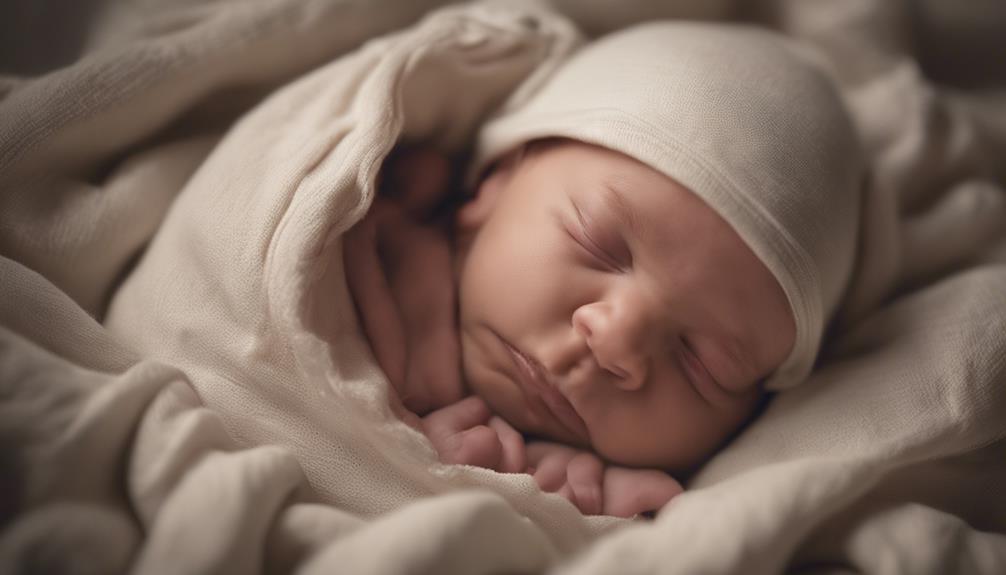As we set sail on uncovering the mystery behind why newborns may shiver in their sleep, let's unravel the layers of this delicate phenomenon.
Picture a tapestry of possible reasons weaving through the night…
Could it be a mere reaction to a chilly room, or perhaps a deeper physiological response?
Stay tuned as we navigate through the top five reasons your little one might be experiencing these shivers, shedding light on what could be causing this nocturnal occurrence.
Key Takeaways
- Shivering in newborns during sleep can signal underlying health conditions like fever, infections, or hypoglycemia.
- Maintaining a room temperature of 68-72°F and dressing newborns in appropriate clothing is crucial for sleep comfort.
- The startle reflex might cause shaky movements during sleep, triggered by sudden noises or movements.
- Hypoglycemia, infections, or fever could be reasons for newborns shivering during sleep, requiring immediate medical attention.
Underlying Health Conditions
When newborns shiver in their sleep, it may indicate the presence of underlying health conditions that require urgent attention from healthcare professionals. Shivering is a common sign in newborns that can be linked to various health issues such as fever, hypoglycemia, infections, neonatal hypothermia, seizures, or neurological disorders.
Fever is often a culprit, signaling that the body is fighting an infection. Hypoglycemia, a condition where blood sugar levels drop dangerously low, can also trigger shivering episodes. Infections, especially those affecting the respiratory system, can cause newborns to shiver as well. Neonatal hypothermia, due to temperature regulation challenges in newborns, is another potential cause. In rare cases, seizures or neurological disorders can manifest as shivering during sleep.
If your newborn consistently shivers in their sleep, it's crucial to consult a healthcare provider to rule out any serious health concerns. Keeping a close eye on your newborn's temperature and observing other symptoms can aid in determining the underlying cause of their shivering episodes.
Room Temperature and Clothing

Maintaining a comfortable room temperature and dressing your newborn appropriately are important factors in preventing shivering during sleep. It's vital to make sure your baby is not too hot or too cold while they rest, as this can impact their sleep comfort. Here are some essential tips to help you create an ideal sleep environment for your little one:
| Room Temperature | Clothing | Recommendations |
|---|---|---|
| 68-72°F (20-22°C) | Appropriate layers | – Maintain a moderate room temperature for sleep comfort. |
| Lightweight fabrics | – Dress your newborn in breathable cotton clothing. | |
| Avoid overdressing | – Be cautious of over-layering to prevent overheating. |
Startle Reflex

Understanding the startle reflex, also known as the Moro reflex, is important for caring for your newborn's sleep patterns and movements. This involuntary response in newborns occurs in reaction to sudden movements or noises, causing the baby to extend their arms, legs, and arch their back in a startle response. It's a vital part of infant development and typically diminishes by 3-6 months of age.
Shaky movements during falling asleep or waking up can often be attributed to the startle reflex, leading to jerky motions in babies. External stimuli, such as loud sounds or abrupt changes in light, can trigger this reflex. As parents, it's essential to be aware of the startle reflex and its effects on your newborn's sleep. By understanding this natural response, you can create a soothing environment that minimizes disturbances and helps your baby rest more peacefully.
Hypoglycemia

Moving from the discussion on the startle reflex to the current topic of hypoglycemia, it's important to recognize that low blood sugar levels can lead to shivering episodes in newborns during sleep. Newborns have limited glycogen stores and depend on regular feeding to keep their blood sugar levels stable. When blood sugar drops too low, the body responds with shivering as a way to generate heat. This physiological response can manifest as jitteriness, sweating, and poor feeding in newborns. If you notice your newborn shivering during sleep or displaying other symptoms of hypoglycemia, it's essential to seek immediate medical attention. Prompt intervention is essential to prevent any potential serious complications that may arise from untreated low blood sugar levels in newborns. Remember, your baby's well-being is our top priority.
| Hypoglycemia Facts | |
|---|---|
| Low Blood Sugar | Shivering in Sleep |
| Limited Glycogen Stores | Jitteriness |
| Frequent Feeding | Sweating |
| Physiological Response | Immediate Medical Attention |
| Potential Complications |
Infection or Fever

If your newborn is shivering in their sleep, it could be a sign of an underlying infection or fever that requires prompt attention. Infections, including viral or bacterial illnesses, can trigger shivering as the body combats the invading pathogens. Fevers commonly accompany infections and may induce shivering as the body attempts to regulate its temperature. This shivering response can also signify the baby's immune system actively fighting off the infection.
To address this, monitoring your baby's temperature is essential. If shivering persists, seeking medical advice is vital to diagnose and treat any underlying infections or fevers. Proper medical intervention not only helps in identifying the issue but also in alleviating the shivering episodes during your newborn's sleep. Remember, swift action can aid in ensuring your baby's well-being and comfort.
Frequently Asked Questions
Is It Normal for a Newborn to Shiver While Sleeping?
Yes, it is normal for a newborn to shiver while sleeping. Their immature nervous system and reflexes can trigger this response. Monitoring the frequency and duration of shivering helps assess normalcy. Factors like external stimuli or temperature changes may contribute.
Should I Be Worried if My Baby Shivers?
We comprehend the worry when your baby shivers. It's natural to be concerned, but sometimes it's part of their development. Trust your instincts, but if you're unsure, seek advice from a healthcare provider for reassurance.
Why Is My Newborn Trembling?
I acknowledge your concern about your newborn trembling. It's common for babies to shiver during sleep due to their developing nervous system. Factors like hunger or external stimuli can contribute. In most cases, it's a natural process.
How Do I Know if My Baby Is Having a Seizure in His Sleep?
If our baby is having a seizure in sleep, we'd observe unusual movements, facial expressions, breathing changes, or altered heart rate. If concerned, we must seek prompt medical evaluation to distinguish between normal movements and potential seizures.
Conclusion
To sum up, it's important to pay attention to your newborn's shivering during sleep. While it could be a normal part of their development, it could also indicate underlying health concerns. By monitoring their movements and consulting a healthcare provider if needed, you can guarantee your baby's well-being and address any potential issues early on.
Remember, your instincts as a parent are a powerful tool in keeping your little one safe and healthy.










